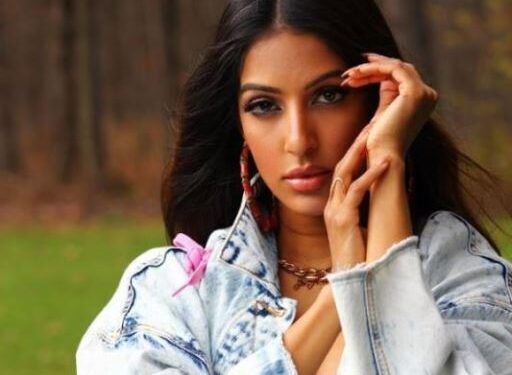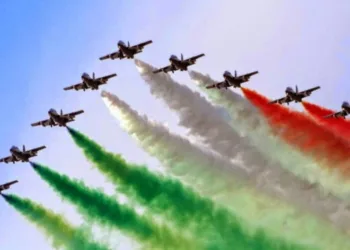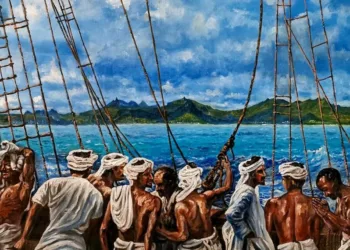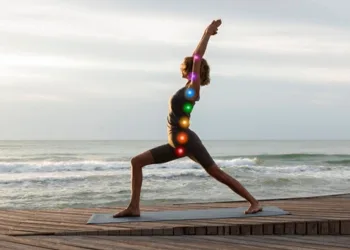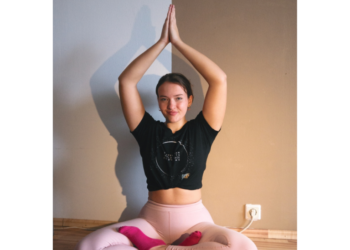RANJINI ‘JINI’ JUNE chose an unusual path; as she puts it, music chose her. From plans to pursue a law degree in New York City, Jini changed course to pursue a career in music. Her story is powerful because of her unique journey as a South Asian in a typically western-dominated industry
I have a core memory of walking home from school when I was seven. Taking advantage of being alone, I started to sing. The sun was bright, its warmth like a blanket on my skin. As I sang, the heat from the sun felt like a hug from the universe. It wasn’t a song I had heard on the radio; just a little ditty I came up with from the top of my head from what I felt at that moment. You couldn’t pay me to remember the lyrics or the melody, all I vividly remember was the feeling of fullness it gave me. Technically speaking, it was the first song I ever wrote. It was then that I realised I had been given a gift of music, an outlet for creativity. I don’t say ‘gift’ from a place of pride, rather it’s from a space of gratitude. It was also just the beginning.
I’m a middle child, flanked by my elder and younger siblings who were far more athletic and extroverted than I was. I had no interest in organised sports, and honestly have zero regrets about not having the ‘soccer team experience’. I dreaded outdoor recess and would pray for rain so we could stay inside and read. My mother, a musician and dancer, proficient in Carnatic vocal, the veena, and Bharatanatyam, ensured that my sister and I learned the Indian performing arts even though we were pretty much your typical American kids. At the time, I did not fully appreciate the 5 am Carnatic vocal lessons or that she would handwrite two copies of a kirtan for my sister and me because that was easier than breaking up a fight between us over one copy. Looking back, it was those lessons that would form the foundation of my musical roots. In elementary school, Thursday quickly became my favourite day of the week. That was music day! I hadn’t started lessons yet and remember being envious of my classmates who were lucky enough to take piano lessons. I would play on an electric keyboard my parents had gifted me for Christmas. I had pleaded with my mom to get me started with piano but for one reason or another, it kept getting put off.
I remember seeing a yellow flyer in the mail with an advertisement from a piano teacher two neighbourhoods over, when I was 11. When my mom told me to book the first lesson, I wasted no time in picking up the phone to make the call. With no proper acoustic piano at the time, to prepare for my lesson each week I would take my piano books to school on Wednesday (my lesson day), skip lunch and practise on a real piano in the chorus room. I’d take a different bus to my teacher’s home and walk the 30 minutes back home and sing on those walks back home when I thought no one was around.
It was my background in piano that propelled me to become voice captain at my high school choir. As a sophomore, I was charged with leading upperclassmen through their warm-ups and harmony parts. It was my first introduction to playing a leading role as a musician. My director’s belief in me helped plant the seed that music was my calling. I remember asking him, “What chance do you think an Indian girl has in the music industry?” He said, “I believe you have more of a chance because you are Indian.” It was what I wanted to hear at the time, but the reality was that using my ethnicity as a crutch was a weak strategy to break into the industry.
I remember sitting with Lady Gaga about a year before she rose to fame. We were chatting about how much piano we use in our sets and what we felt made us different from other artistes. She asked how much of my ‘Indian-ness’ I relied on to market my music. By then, I had learned the hard way that you can pigeonhole yourself by forcing Indian nuances into your music for the sake of sounding different. I responded that I used Indian flavours in my music sparingly and that it depended on whether that fit organically in a recording. The last thing I would want is to cheapen the Indian art form by using it as a gimmick. Gaga’s reaction was one of appreciation and respect.
My first real break in the industry came when I met my producer, Quincy Patrick, who years later would become my husband. At the time, he was riding high at having two #1 singles on the pop and R&B charts simultaneously. He would go on to win a Grammy for Best Contemporary R&B Album for his work with The Temptations. Quincy was assembling a multi-cultural girl group at the time. I auditioned and he signed me
on the spot. He said I had a lot to learn, but would be a perfect fit in the group.
After six months of working with the group and trying to juggle classes at NYU, a meeting was called regarding my plans about continuing with school. The consensus was that if I was serious about a career in music, I would have to take a break from school. It was the hardest decision I’ve ever had to make, but I chose to put my college career at my dream school on hold to focus solely on music. While it was terrifying, there was something liberating about knowing I now had a singular focus—that I no longer had one foot in and one foot out of the door.
The college drop-out conversation with my father went something like this: “Dad, you know I love music, and this is what I’ve decided to do—quit school to become a pop star.” I wasn’t asking, simply stating what I was going to do and how I planned to go about making it happen. I’d like to think my parents supported me because of their belief in me; but if I’m honest, I think at the time they just knew it would be futile to try to change my mind.
After around 10 record label meetings, and countless performances throughout the tri-state area, the group broke up. That’s when the panic set in. The only saving grace was the overwhelming response from insiders who had watched us perform and that Quincy should go solo with the ‘Indian chick.’ That was the birth of my solo music career.
My first breakout single was a remix of Akon’s “Don’t Matter” which went viral on Myspace. This was followed by my R&B single, “Instant Message”, which was my first song that ever received radio airplay. My Carnatic remix of Ed Sheeran’s “Shape of You” received viral attention via Facebook specifically among the Indian diaspora. Amid the pandemic, my piano videos mashing up classical and rap music began to take off on TikTok. Surfing from one social media platform to the next as the years have gone by has been no easy feat, but is necessary to self-market as an independent artiste. At the moment, I’m on the verge of releasing my newest single, “Pleasure Island”, a sultry, mid-tempo song with a throwback vibe especially for my R&B audience.
In the midst of my music journey, Quincy and I co-founded a non-profit music charity, Dreamality, Inc., which brings music education programmes, music therapy and scholarships to kids in communities of need and the developmentally disabled. This passion project is our way of paying it forward. If it weren’t for the incredible teachers that we had access to in school growing up, we would not have been inspired to pursue music careers ourselves. To date, we have brought our programmes to close to 4,000 students since our inception in 2013. In addition to our outreach, I teach piano and voice to students globally thanks to Zoom and maintain a roster of about 60 students. Many of my piano students have performed as soloists at Carnegie Hall and one of my voice students was invited to sing the national anthem at the NFL’S New York Jets opening game. Witnessing their wins is an unexplainable feeling.
Sometimes, especially when I can’t quite see the light at the end of the tunnel, I wonder what my life would look like had I gone to law school. Would it have been easier to follow a more straightforward path, with all the goal posts in place to let me know I was on the right track? But if I’m honest, there was never a fork in the road that offered me a choice. I have always been walking on a cracked, foggy, trail of dreams. When the pressure gets too much, I remember my seven-year-old self and the way the universe hugged me all those years ago when walking home from school. No better affirmation is needed for me to know that I am, indeed, right where I was meant to be.
(Jini June is an Indian-American pop/ R&B singer-songwriter, and pianist.)


